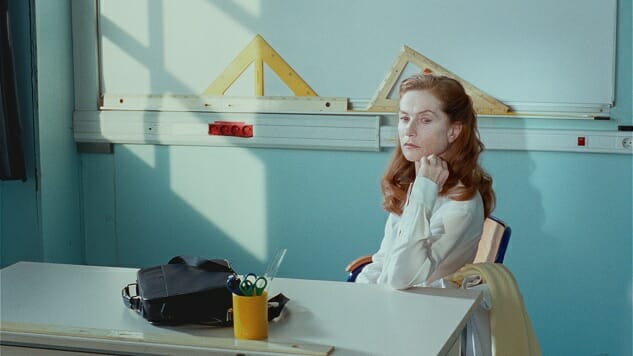Mrs. Hyde

There are problems with Mrs. Hyde that have nothing whatsoever to do with Bozon’s puzzling creative choices, though for perspective’s sake, the problems are dwarfed by the choices. Yes, the film hinges on a matter of split identity, and yes, the split identity hinges on some mad science. Bozon’s protagonist, Marie Géquil (Isabelle Huppert), is a mild-mannered high school physics professor scoffed at by her peers, bullied by her students and unquestioningly devoted to her profession. Then, while conducting an ill-advised late night experiment in her laboratory, she is struck by lightning and subsequently develops a dual personality, the Mrs. Hyde of the title. The change in her registers at first as odd, and then as troubling, as the meek Géquil slowly develops a backbone nobody who knows her thought she possessed.
The similarities between Bozon’s film and Robert Louis Stevenson’s The Strange Case of Dr. Jekyll and Mr. Hyde end there. Mrs. Hyde is Stephenson adjacent, such a massive departure from the book that claiming The Strange Case of Dr. Jekyll and Mr. Hyde as inspiration feels like a bluff, and when you’re veering that far away from your adapted text, then what the hell’s the point? Where Edward Hyde took over the body of his host, Henry Jekyll, in the wee hours to go about London stomping on children and acting like an all-purpose asshole, Mrs. Hyde takes over Géquil and she…sits on a bench by the road. Granted, she also glows hot orange instead of shapeshifting into an unruly and diminutive man, and after a while she begins roasting people and dogs alive when the spirit moves her. (Maybe she is kind of an asshole.) In keeping with traditions of French cinema and with Bozon’s own deadpan aesthetic, that’s about all she does, though, which effectively renders Mrs. Hyde aloof at worst and inscrutable at best (and occasionally comical in between, because why not).
None of these choices are unappealing, either individually or together. It’s just that they never come together to form a greater statement about anything that transpires in Mrs. Hyde’s plot. The foundation of the film is Géquil’s timidity: She’s a human doormat, a ghost at the edge of her students’ awareness, shyly pleading for order on the other side of their static. She’s always just out of range of their attention. Her husband, Pierre (José Garcia), notices her, but struggles to get her to notice him in one of Mrs. Hyde’s more compelling role reversals. Her boss, the school principal (Romain Duris), notices her, too, but he’s a blowhard and a boor, incapable of carrying out a conversation with anyone on any subject without appointing them backhanded compliments or blundering through accidental racism.
-

-

-

-

-

-

-

-

-

-

-

-

-

-

-

-

-

-

-

-

-

-

-

-

-

-

-

-

-

-

-

-

-

-

-

-

-

-

-

-








































